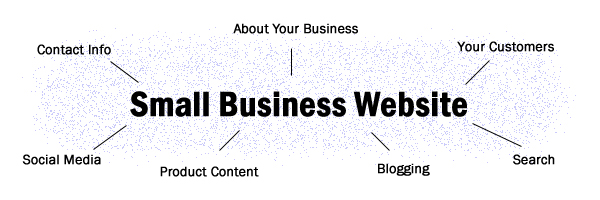Role of the business owner when creating a new small business website
Website companies get caught up in what they are going to do for you and what technologies they are going to use. But what about what the business owner is going to do? The business owner hears search engine this and social media that…it may be all new them. It can be overwhelming. While I don’t think the technology matters as much as it used to, some companies insist on showing off their expertise of technologies and coding languages. So before you get caught up in technology word vomit, here is a short list of what you, the business owner, will be accountable for and what to expect.
Be part of the decision
If this is the first website for your small business, be ready to discuss with your marketing company what your website address will be. They should have some great suggestions for you, but once you get started using that address, all marketing efforts will be aimed at that one address, so it is an important discussion. Not only that, but your business has to live with that address, so make sure you feel comfortable with it.
Do you have a webpage already?
Maybe you hired a web page design company to redo your existing site. Not a problem, that is fairly common. Dig through your old emails and find y0ur domain name registration information and your host information. This will include: Which company they each are with, login names and passwords.
You will need these for a couple of reasons. First, just so we are on the same page, a domain name registrar handles your .com name, such as austin-webpages.com.
Without getting too complicated, your domain registrar knows who your host is. Your host is simply a computer that is housing all the files that make your webpage work. So when someone goes to your website, your domain finds your host, your hosts handles showing the webpage to your visitor. (There is a networking expert ready to kill me for simplifying it that much)
Now…why would you need to dig this up? We have had clients who, in the past, used certain services, like godaddy’s website tonight, that allowed for quick, cookie cutter webpage to be setup. Which is fine, except the small business then outgrew these sorts of websites. The problem is, these kinds of hosting services don’t allow for full blown, professional websites, until you call them up and switch to a more traditional host plan. Not a big deal, but you might need your account number or login credentials when you are on the phone with the hosting company.
Once your web designer has your log-in info, they should be able to handle most if not all configurations from that point forward.
Ok, you got all my log-in info…now what?
For brand new small business websites, you are still going to play the crucial role of subject matter expert. Depending on what arrangement you have with your marketing company (SEO or other sort), you may play this role indefinitely. One of the pillars of creating a great website is to keep it constantly growing, constantly providing information for its customers and audience. That may be through a blog, via a video or with social media. Large firms are able to hire professional writers who cover your market and can provide this constant fresh content for you, and your role may be reduced, possibly at a premium cost. But remember, whatever is published on your site is absorbed by your customers, so it is not a bad idea to work with your marketing / SEO firm to provide that expertise from actual experts.
A few other things to be prepared for
You will be asked about approving some graphical designs and other things to see that they are your liking. But that should be exciting as you can see your brand begin to take shape and have its own personality.
The goal of your marketing campaign is to make your phone ring off the hook. A small business with a small staff needs to be prepared to (hopefully) handle the increase of inbound communication. It can possibly come through a medium that is not the norm for a company, such as email or social media. As a company, your customer communication should be a high priority, and this could be a great time to look for some business process improvements to handle the extra communication.
Contact us today to get your small business online and expand your customer base.
